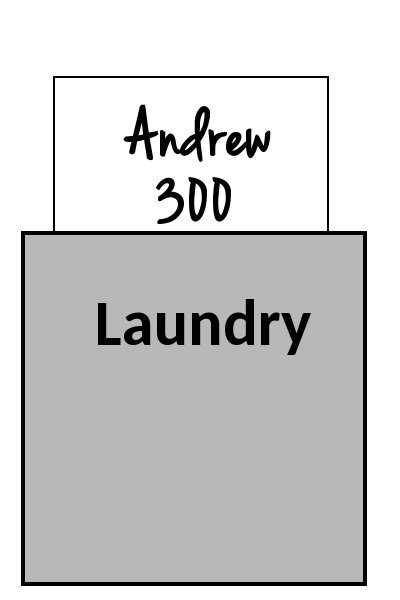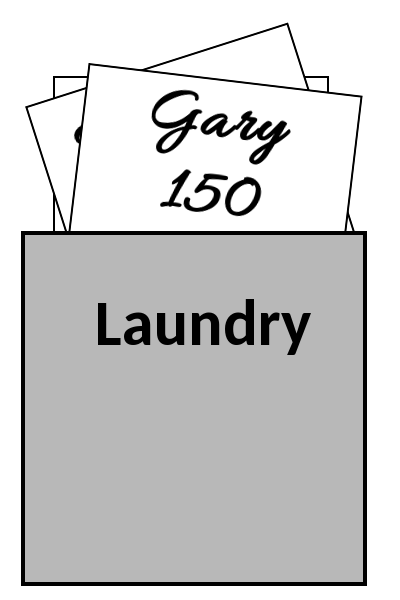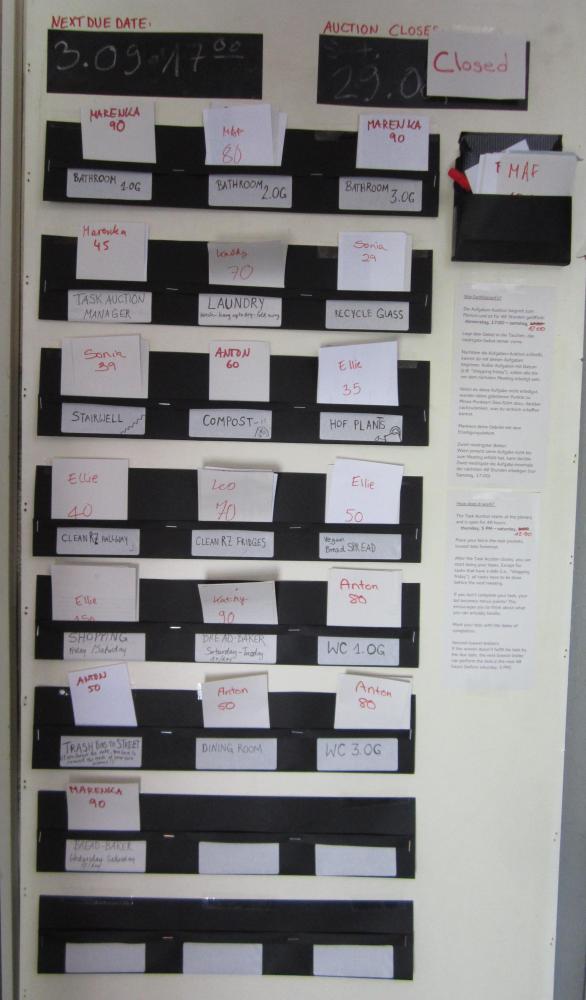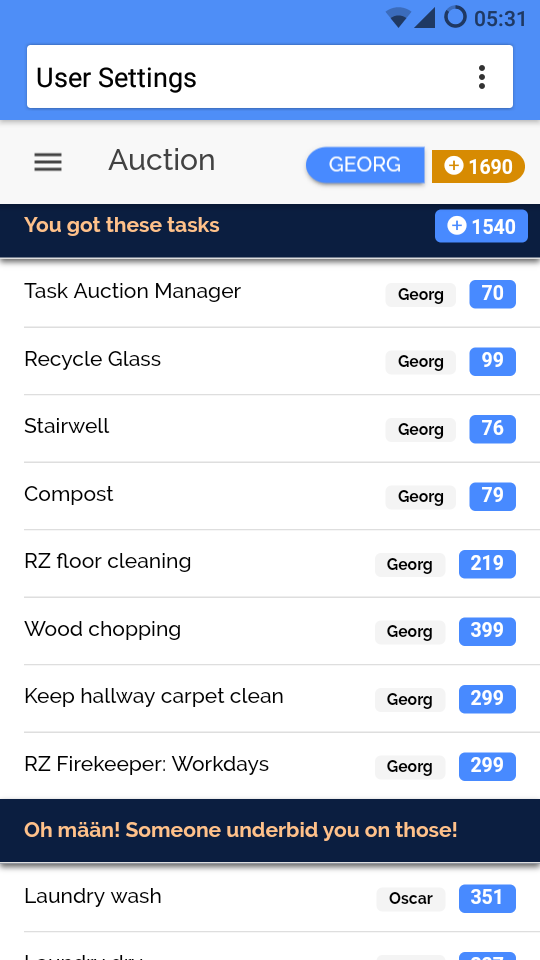For any living community, how chores are distributed/performed is a source of friction. After many years of experimentation, we have arrived at the task auction.
Each Wednesday after plenary, a reverse auction for chores begins. The resident who bids the least amount of points for a chore wins the chore, and must complete it before the following Wednesday in order to be awarded the points.
Here is how a bidding round might go like this, with Gary as the winner



Rules
- The auction is open a set amount of hours. In our house, it has been 24h at times, currently it’s open only for 30 minutes after plenary. We have found that this way, people are less likely to forget to bid, and it is more fun because the competition and tension is increased.
- Unperformed tasks result in negative points being awarded to the auction winner.
- Unnecessary tasks result in 0 points being awarded to the auction winner. For example, if there was no recycling to take out, 0 points are awarded.
Practical Use
- A photograph is made at when the auction closes. The results may not be thereafter altered. An auction which cannot be closed convincingly is not an auction.
- If a task has no specified deadline, the default is before the next meeting. Some tasks (like shopping) have their own deadlines, while others (like maintaining the furnaces) have no conceivable deadline.
- If someone else does the task, the auction winner still wins the points. If there is any trading of tasks, it must be done outside the auction system. See (1).
- There are no police. We just ask people to report what they did. For whatever reason, people don’t seem to lie about this. In fact, we encourage people to check off tasks as soon as they are completed in order to minimise the meeting time needed to close the task cycle.
- We have retroactively awarded points by meeting-time consensus when a task had to be performed outside the auction, for example, fixing a leak.
- We had to move dinners out of the auction. Few people were willing to risk a loss of points because of a late return to the house or because of some change of plans. The points awarded to dinners are now fixed. It is possible to sign up spontaneously. The dinners inadvertently serve as the reference task, which has an anti-inflationary effect.
- When the ratio of tasks to residents is too high, one of two things happens:
- Inflation: The value for tasks rises. This undermines the value of points earned in the past. Fortunately, it is usually possible to suspend tasks in order to get the ratio back in range. With fewer residents, things need to be cleaned less frequently, so it is usually possible to go to an alternate-week cleaning schedule for most things.
- Market break-down: people bid arbitrary points, and there is no counter-bidding because each person feels he/she already has too many tasks. Without meaningful equivalency, participation is undermined. For example, if Person A receives 250 points for shopping and Person B gets 400 for sweeping the hall, Person A is demotivated. The number of tasks must be reduced so there again is counter-bidding.
Implementations

The task auction may be conducted on a panel in a public area, using paper pockets and slips of paper.

It is also possible to implement it as a website/mobile app. This version seems to be more lively.
Goals
- Fairness: Somehow, we have to avoid the situation where one person changes a light bulb and claims to have done his part, while others are renovating or shopping.
- Equivalency: Some tasks take longer than others (laundry), some are more disgusting (compost), some require technical competence (repair water heater). One hard chore might be worth two easy ones, and we need a way to calculate that. Market valuation is really the only uncontroversial way of doing it.
- Democracy: A committee isn’t needed to decide which chores are worth what. Everyone is empowered to decide. Anywone who disagrees with the valuation of a task can change the value by bidding.
- Transparency: We can see who is participating in the household, and who is free-loading.
- Flexibility: If a resident is too busy one week, he/she can choose to do nothing and take on more tasks the next week. No discussion is needed; exceptions are handled naturally by the design of the system.
- Electoral Share Market: The points can be used for voting.
Advantages
We have tried several systems and the task auction has the following advantages over all of them:
- It does a lot of work with few rules. Rules weigh on the users and they are often forgotten or misinterpreted.
- Sign up is fast and takes up no time during the house meeting.
- The bureacracy associated with the system is light compared to our other systems.
Two-class society
In any living group, there are people who are more industrious and those who are less so. The industrious think of the others as free-loaders and the less industrious think of the others as fascists.
Regardless of which view is right, the outcome is the same: a two class system of those who serve and those are served. The Task Auction doesn’t change that. It only makes it transparent. The Electoral Share Market changes that.
Criticism
Isn’t this sorda capitalist?
The most frequent criticism we’ve heard, albeit still rare, is that the Task Auction is a market-based solution, and capitalists like that sort of thing. Capitalists also like refrigerators, but that’s not a reason to stop using refrigerators. The only people who have made this criticism were people who were reluctant to do chores under any system. What they wanted was opacity. Consider the following:
- A capitalist system needs capital. In the free market, some people have a lot of capital and other people depend on that capital to do their projects. They try to be nice to the people who have capital by accepting their rules, which capitalists enforce by bribing politicians. There is no such concept in the task auction. In the task auction, we all have the same amount of capital, 24h per day. Nobody is dependent on someone else to give their capital and nobody has to abide by someone else‘s rules in order to get access to their capital.
- Capitalism, at least the one in place at the moment in our world, is based on abuse. Some people, mostly, the ones that we can’t watch working for us, work for an elite (us), underpaid and many more hours than we do. Compared to our leaders and company owners, we are also abused, just not as much as other people in other countries. There is no abuse structure in the task auction. There no control, other than self-control, and there is a lot of freedom as well in your choices: You can choose tasks that only take 5 minutes of your time, but are for example disgusting and thus unloved, or things that take a lot of time, but are fun, like cooking (for some). You can also choose the time you want to do your tasks – or if you prefer, you may take tasks that have a deadline. You can also choose to have no tasks at all. Of course, like with anything in this world, everything you do has consequences and it might be the case that people living with you don’t like it if you choose not to participate in house chores for weeks at a time.
- Just because we use an auction to assess the current ‘value‘ of a task, it doesn’t mean it’s like a free market job, because the wages of free market jobs are dependent on how much you are willing to be paid in order to do them (which is also true for the task auction) – but it‘s never how much your employer is willing to do them for! If your employer offers you a job, it is because they think that you would accept it, not because they would accept it for themselves. If you ask Jeff Bezos for how much he would do the job of his secretary, we bet you he would name a much higher prize than what he is actually paying the secretary. In the task auction, the points are awarded by voting, and these are votes that are not theoretical but are based on your willingness to do the task for the points that you think someone else should do them at most for. Quite contrary to free market wages system! The task auction, in the end, is egalitarian in a way that both communism and the free market never can be.
- The task auction is highly democratic, in exactly the right way, namely in that you can only cast votes that you really mean. You can’t cast votes that are theoretical, somehow “right” according to your own rules or whatever, and you can’t complain about someone having cast too many points if you are not willing to do that task for less points yourself. It really settles all of the equivalency problems that capitalism has.
The Task Auction is designed to make people feel bad if they don’t accumulate enough points
- This actually happens in the free market capitalist system: Because the actual value of your work is not valued properly (i.e., you get less money than you are entitled to, especially compared to the people who are making money with your work!), people are naturally cranky at the capitalist system. It makes you feel less „worth“ than others if you earn less, although you might even be working harder. It is fucked up, agreed, but this would be easily fixed if employers could only offer you wages that they themselves would be willing to accept if they had to take these jobs. So that problem, we fixed.
- If you are in any group of people, and somebody puts in less work or investment than others, the imbalance will be apparent one way or the other. This part, of feeling bad when you have not so many tasks and thus not acquiring so many points, is in place everywhere – we have it just more transparent.
Conclusion
Our Task Auction has nothing to do with capitalism.
